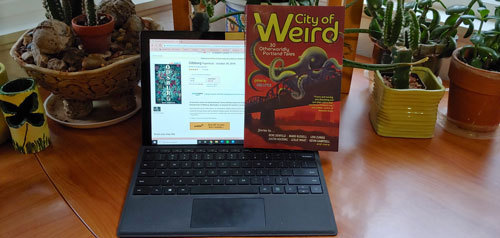One of the perhaps forgotten challenges to writing and publishing books is explaining to others what it’s about.
In the publishing world, this struggle is combated with what we know as “comp titles,” which Penguin Random House defines as “an elevator pitch for your book.” Comp titles are published media (typically books, but they can also be movies, podcasts, YouTube channels, etc.) that allow you to explain what a book is like in just a few seconds, getting someone interested in the idea before they lose focus.
Depending on who you ask, “comp” can mean “competitive” or “comparative.” And these terms can actually help us distinguish between the two different uses for comp titles within the publishing industry.
Competitive Titles as a Projecting Tool
When used in acquisitions and sales work, comp titles are “industry facing,” meaning they are useful to give publishers insight on how they can expect a book to perform. It is helpful for these titles to be of a similar subject matter as the work at hand so the publisher can see how much demand there is in the market for that topic. Publishers use competitive titles to see how many copies have been sold and around when the most purchases have been made.
These titles are also helpful in giving publishers ideas on how to market their work. Because of this, competitive titles for sales and acquisitions should be from similarly-sized publishing houses. It is beneficial for publishers to check out what other similarly-sized operations are doing to see what is or isn’t working in the market.
Additionally, publishers can use competitive titles to find potential subjects for review and blurb requests. Small publishers can check out a similar book by a similarly-sized publisher on Goodreads and think, “Hey! John Doe, who wrote A Super Awesome Book for Humans, reviewed this book. Maybe he would review our book, too.”
Competitive books should also be published within the last few years so the publisher can get a recent view of the current market, and they should have a similar format and similar content. For example, a paperback fiction book should not have a hardcover nonfiction book from 1978 as a competitive title.
To recap, competitive titles are useful to give people within the publishing industry an idea of how well a book could potentially perform, and how one might tackle realistically getting that book out into the world.
Comparative Titles as a Positioning Tool
On the other side of the coin are comparative titles. These can be thought of as an audience-facing tool, and are mostly used by the marketing department and by those outside the publishing house like booksellers or distributors.
As insightfully described by HuffPost, comparative titles can be thought of as a publisher’s version of Amazon’s “Consumers Who Bought This Item Also Bought” section. This is a great place to see what a distinct consumer base is interested in, and the same idea is applied to comparative titles.
Comparative titles can and should be more popular titles from larger publishers. When used by marketers, comparative titles are a way to say “So, you liked The Goldfinch? Well, if you liked that book, you will LOVE our book, which features similar elements of family drama and coming-of-age maturation.”
Publishers can also see when these comparative titles have been most successful, giving marketers insight on when they can make a push for their book. For example, was a comparative title a popular Mother’s Day gift? Could your title also be a popular Mother’s Day gift? If so, consider scheduling the release day or marketing campaigns in conjunction with Mother’s Day.
These comparative titles are also good to pass on to potential buyers, booksellers, and libraries. These people may be asked for suggestions from readers for books similar to one they have enjoyed. If you have made a point to list some popular titles that have a similar tone or topic to your book, the librarian or bookseller may direct a reader to your book as the next read for their customer.
So unlike competitive titles, comparative titles can be any kind of book from any kind of publisher as long as the book is similar to the one you are trying to sell.
Although finding comp titles can be a frustrating process often involving a long trek down several Amazonian rabbit holes, they provide vital insight on a book’s sale and audience potential—and it often adds many books to our To Be Read list as well.

